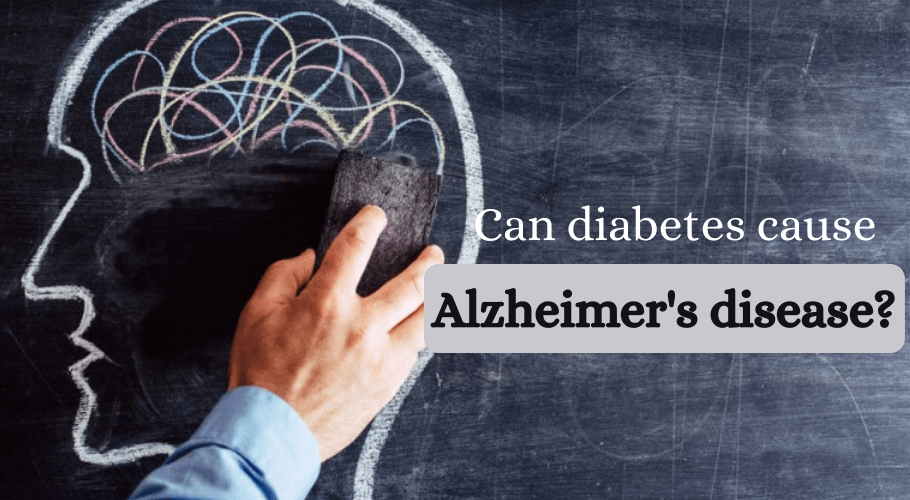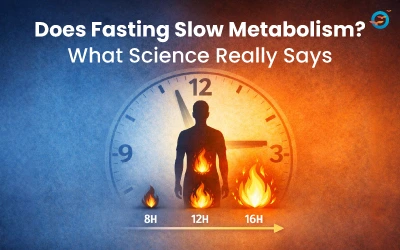Does Diabetes Cause Alzheimer’s?

While there is still no formal study that has shown a clear causal connection between diabetes and Alzheimer’s, there is data that suggests that people with type 2 diabetes are at higher risk of contracting Alzheimer’s. The reason for this is the damage caused to blood vessels in the brain, leading to the insufficient or blocked blood supply.
How does diabetes cause Alzheimer's disease?
Alzheimer’s is a progressive brain disorder that damages memory, the ability to reason, communicate, and carry out everyday activities. It can also lead to personality changes—anxiety, agitation, and delusions, being the common ones.
When excessive blood sugar begins to build up, it affects the functioning of various organs; it triggers a rise in LDL or bad cholesterol, a drop-in HDL—or good cholesterol—and causes plaque to build up on arterial walls. This effectively narrows arteries, leading to a rise in BP, which, in turn, further damages the smaller blood vessels that carry oxygenated blood to various organs.
Diabetes thus increases the risk of heart damage, and stroke by destroying blood vessels in the brain; this is also a contributing cause of Alzheimer’s. High blood sugar levels (BSL) also cause inflammation in the body. This inflammation exacerbates damage to brain cells, feeling Alzheimer’s progress.
As BSL rises, the body starts to produce more insulin to try and address the problem. This rise in insulin can cause other hormones/brain chemicals to become unbalanced, and triggering Alzheimer’s.
Diabetes is also known to be the cause of other health problems, including:
- Cardiac problems
- Stroke
- Eye problems
- Kidney damage
- Diabetic neuropathy—caused by nerve damage—indicated by pain/burning sensations in your feet or hands
- Digestive problems
- Infertility—in both sexes
Who is most at risk for Alzheimer's?
-
Why is age a risk factor for Alzheimer's?
Older populations are more vulnerable to Alzheimer’s. Industry statistics estimates show that one in eight people over 65 is at risk, while nearly half of all people over 85 already have it to some degree, or are suffering from other dementias.
-
How do genetics play a role in Alzheimer's disease?
Family history of Alzheimer’s is a big risk factor, with research showing that people with a parent or sibling suffering from Alzheimer’s is more likely to develop the disease themselves.
What are some preventions for Alzheimer's disease?
One of the biggest actions diabetics can take to safeguard themselves from Alzheimer’s is to get their BSL in the normal range. A few things that one can do to cut their risk and prevent/control diabetes are:
- Lose weight—especially belly or visceral fat
- Get more active: Start with a minimum of 1 hour a day for five days a week
- Eat a nutritious diet: In addition to losing the high-glycemic foods, diabetics and diabetes-vulnerable populations should cut out fatty, oily and fried foods.
- Keep your brain sharp. Anecdotal evidence suggests that keeping the brain active—activities like Sudoku, Chess, playing a musical instrument, for instance, can help reduce the risk of contracting Alzheimer’s.
- Stop smoking
- Don’t consume alcohol or drink in moderation
Conclusion
Remember, even small changes can make a difference. So, if you’re suffering from diabetes. Start getting your blood sugar levels in the normal range today. With a proper diet-exercise-stress management routine, you can even completely reverse diabetes. Freedom from Diabetes regularly holds guided programs to help diabetics get free of the condition.
We also release a ton of information to guide and help people suffering from insulin-resistance-related disorders—BP, PCOD/S, Obesity, Cholesterol, etc.—improve their health, and often get completely free of medicines. Visit our website: www.freedomfromdiabetes.org, and subscribe to our Youtube Channel and Facebook page for more information.
Disclaimer:
This Blog solely serves our marketing purposes, for Authentic knowledge for this topic, Please join our upcoming Discover Reversal Session

